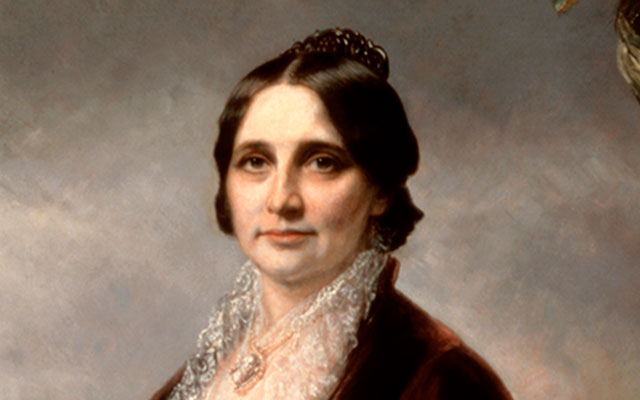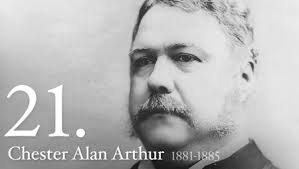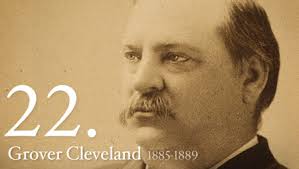I want to start by saying this is not my favorite topic in History 1302. I find it somewhat boring and I'm a historian. But, I'm not the only one who feels that way. Well known historian Henry Adams said 19th century politics "was poor in purpose and barren in results."







One problem was that there was very little difference in Democrats and Republicans. Economic policy was the main issue. Democrats were for laissez-faire government, low tariffs (taxes on imports), restricting immigration, and were pro-agriculture. Democrats also tended to favor the ever-boring issue of what to do with silver and they wanted more in circulation to help miners.
Republicans tended to favor tariffs to protect U.S. industries and federal subsidies to railroads. They were pro-business, pro-Union veterans' programs, and preferred the increased use of gold over silver.
Wow! That's exciting. Actually there were more differences within the parties that between them.
At the same time, Americans really got into politics. Elections tended to be close and Congress changed power between Democrats and Republicans eight times in eleven elections. There was high voter turnout usually around 80% of eligible voters. Of course, half the population could not vote including women and over the years harassment let to decreasing votes by minorities. But, for white men the elections were spirited even though often there were no issues. In that era, though, it was party affiliation that drove elections and turnout. Unlike today, most voters had strong party allegiances.
One of the most interesting developments was the appearance of many 3rd parties and new government philosophies including the Populists (or People's party), socialism, communism, and anarchism. At this time, go to the main politics page at 19th Century. Scroll down the page to the politics section and read about the presidents and other political topics. There is also a Presidents/First Ladies Exercise for Project(s) points if you are interested. Please let me know if you find anything interesting about Presidents/First Ladies Hayes, Garfield, Arthur, Cleveland, Harrison, Cleveland again, and McKinley. Also read about the Populist and other ideas especially the Populists and Emma Goldman and the anarchists. She's more interesting. Also, take a look at the section "Economics." In addition, note that at the top of the page under "Youtube" there are a few recordings of the people being studied,
After that return to this page. There is a link at the top of the 19th century page.
Socialism was one. We defined that previously but here is more information. It is an economic system in which workers possess political power, control means of production, and the distribution of goods. It is a system that includes a centralized government that distributes wealth and provides need services on behalf of workers. The first Socialist Party in the U.S. was founded in 1879. Eugene Debs (Pullman Strike) emerged as the leader and ran for President five times. My favorite story about him was the irritation he caused his wife. She said she couldl not trust him with a coat because everytime he had a coat he would give it away to someone who needed it more.
Communism also became popular after the publication of the Communist Manifesto in 1848. Communism is a utopian plan for society in which competition and economic class are eliminated. The individual is less important than the community. Workers are supposed to unite in revolt and seize the factories. Violence was used if necessary. When the government was taken over by Communists, they chose a temporary dictator until the workers were ready to take over. There is an obvious problems with this. How many dictators want to leave their position? And, as we have seen in recent history, Communism has many flaws. They have failed to created totally equal societies. Only a few truly Communist countries exist. For example, China is a Communist country but they have a McDonald's too.
Anarchism in the 19th century was quite different than what we think of today. We think of people like Timothy McVeigh who was responsible for the Oklahoma City bombing. It was different in the late 19th century. They tried to promote non-violence although they did not always succeed in that goal. Anarchists believe all laws are against workers so there should be no government. They wanted to govern themselves in small communities. There also would be a peaceful redistribution of wealth to level economic classes. People would willingly redistribute goods. For example, if you have two cars and I don't have any cars, you would gladly give me one of your cars so we would be equal. Would you do that? All of this was supposedly going to be peaceful.
Another radical in the late 19th century was Jacob Coxey. He was an Ohio businessman who organized an "Industrial Army." His main concern was the Panic of 1893. He demanded creation of government jobs and other social programs. His claim to fame, however, was his "March on Washington." This was the first time Americans organized a march to protest against the government in our history. There have been many since then but Coxey's march was the first (1894). It did not go well for Coxey and his Army. They were forcibly run out of Washington and Coxey was arrested for trespassing when he tried to read a statement from the capital steps.
But most Americans were not radical and the election of 1896 proved that. It was an election in which the parties had very different platforms for a change. The Democrats were pro-agriculture and basically adopted the views of the Populist party which basically joined the Democrats. Republicans favored business and aggressive foreign policy. The conservative Republican, William McKinley won. This leads to a dramatic change in our foreign policy that had begun in 1890.
Before we get to that, however, let's take a break and have some fun with our next topic Social History. Go to that page at this time.